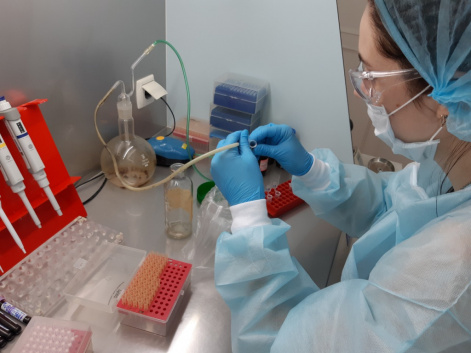Measures are being taken to establish RAS-supervised schools
31 May 2019 г. FRC KSC SB RAS

At the beginning of 2019, the Ministry of Education of the Russian Federation, together with the Russian Academy of Sciences, proposed to create schools under the supervision of the Russian Academy of Sciences on the basis of 32 regions of the country. The main idea of their establishment is to teach and train talented children and to prepare future researchers for science. During the planning of the project, a decision was made that three schools fr om Krasnoyarsk would participate in this project: gymnasium No. 13 “Akadem”, lyceum No. 7 and secondary school No. 10.
On May 20, under the leadership of the Minister of Education of the Krasnoyarsk Region - Svetlana Makovskaya, a meeting was held on the creation of RAS-supervised schools, where the staff of the Krasnoyarsk Science Center SB RAS and directors of educational institutions discussed the current state of affairs.
In Krasnoyarsk at the first stage the project is expected to be implemented in the form of additional lab classes. There, along with general education, students will receive additional in-depth knowledge. Theoretical and practical classes will be conducted both by school teachers and researchers of KSC SB RAS.
“In each of these schools a laboratory class will be created, where children will not only attend additional lectures, but also conduct independent scientific experiments. The project is very promising. After completing two years of basic training, students are expected to be part-time employed by research institutions as laboratory assistants. After such training, it will be easier for them to decide on the choice of speciality at the university, ” says Vasily Shabanov, Academician of the Russian Academy of Sciences, scientific supervisor of the Krasnoyarsk Science Center SB RAS.
The Krasnoyarsk Science Center SB RAS has already developed preliminary educational plans and assigned scientific supervisors of these schools. Marina Smolnikova, leading research associate of the Research Institute of Medical Problems of the North, head of the Molecular Genetic Research Group, was appointed Supervisor of the gymnasium No. 13 “Akadem”. The gymnasium will develop the molecular genetic direction, in which students will be offered to study personalized medicine.
“I was invited to be a supervisor at gymnasium No. 13. Our goal is to acquaint schoolchildren with modern science, to tell about the development of personalized tools for predicting diseases based on molecular biology and genetics, to learn how to identify molecular genetic markers of the main socially significant diseases using the examples of respiratory, cardiovascular, and gastrointestinal diseases. This subject is now a priority and of relevance throughout the world ", - says Marina Smolnikova.
The scientist notes that a genetic laboratory will be created in gymnasium No. 13, in which schoolchildren will be able to isolate DNA fr om biological material, for example, saliva or buccal epithelium (cellular tissue on the inner side of the cheek), carry out genotyping identifying differences in the DNA sequence of individual gene mutations of metabolites and based on the analysis of the results, predict the development of severe forms of the studied diseases.
For this purpose, in the gymnasium a class has already been allocated, to be repaired with the creation of compartment-boxes - separate rooms for research. The laboratory will include two parts, in one theoretical studies will be conducted, in the other modern equipment for performing molecular genetic analyses will be installed, wh ere students under the supervision of researchers will be able to conduct experiments with DNA.
However, students will not be able to carry out experiments without special theoretical knowledge; in order to process the data they will need to master statistical methods and strengthen scientific and technical English. The gymnasium has already worked out the curriculum for the next year, this including training modules in molecular biology and genetics.
Supervision of Lyceum No. 7 is given to Oksana Taran, Deputy Director for Science of the Institute of Chemistry and Chemical Technology. In this school, emphasis will be placed on chemical and biological research, primarily on the integrated processing of renewable raw materials. Andrei Vyunyshev, Deputy Director for Science of the L.V. Kirensky Institute of Physics. The school will be focused on the physical and mathematical direction, in particular, condensed matter physics and photonics.
The project of creating RAS-supervised schools will orient schoolchildren towards choosing a career in the field of science and high technologies. Its outcome should be the influx of young scientists into scientific and educational organizations and research centers of the country.
Despite the fact that the staff of the research center and the administrators of secondary schools have already prepared a program sheet and the launch of the program has been appointed by the RF Ministry of Education on September 1 of the current year, the sources of funding have not yet been found.
“The main thing is not to stop on the creation of such lab classes. In the future, the project should be developed into a network school at the Russian Academy of Sciences, wh ere any interested student can come to listen to lectures and conduct his own research work. Then, the children will immediately be introduced to science, they will understand what they like, and what they would like to do, and, most importantly, how to do it. This model of education is very effective, both for students and for research institutes. Schoolchildren will understand that modern scientific devices are available in Krasnoyarsk; learn how their teachers, older “scientific brothers”, attend conferences in Europe, China, and discuss results of advanced studies. Then, they would not move to Moscow, as they will be able to see the scientific potential of their own region, ” explains Nikita Volkov, Doctor of physical and mathematical sciences, Director of the Krasnoyarsk Science Center SB RAS.
Share:
